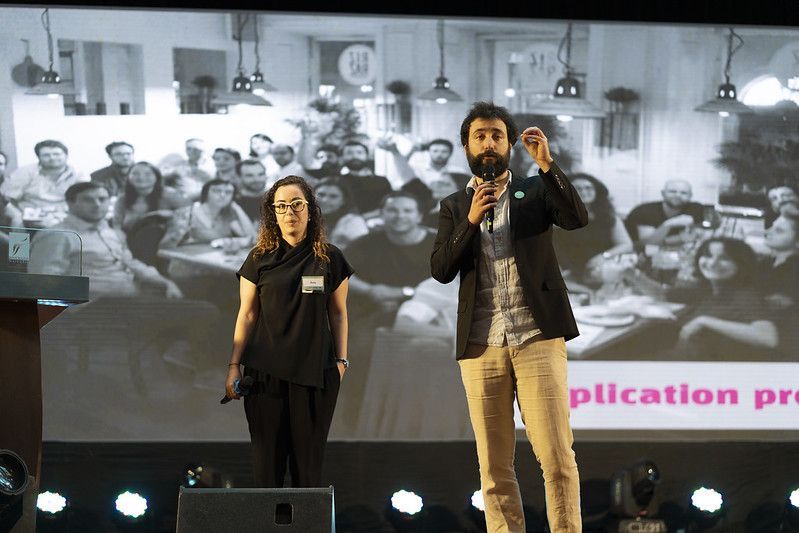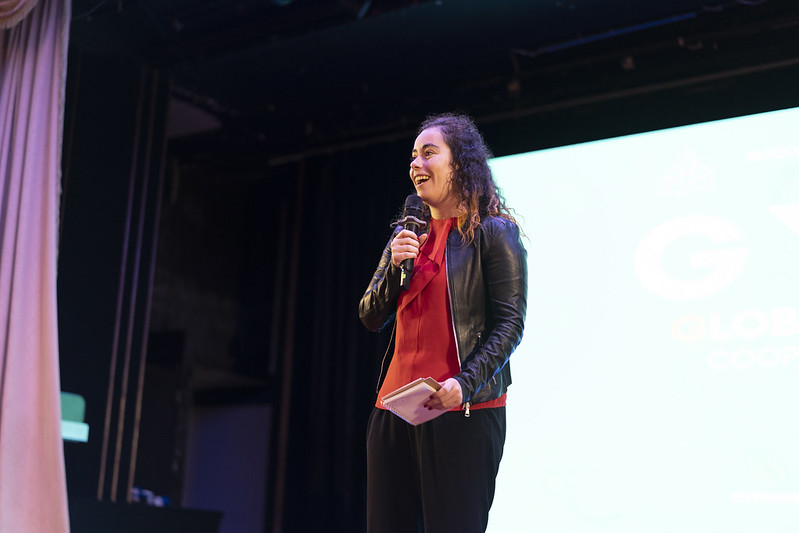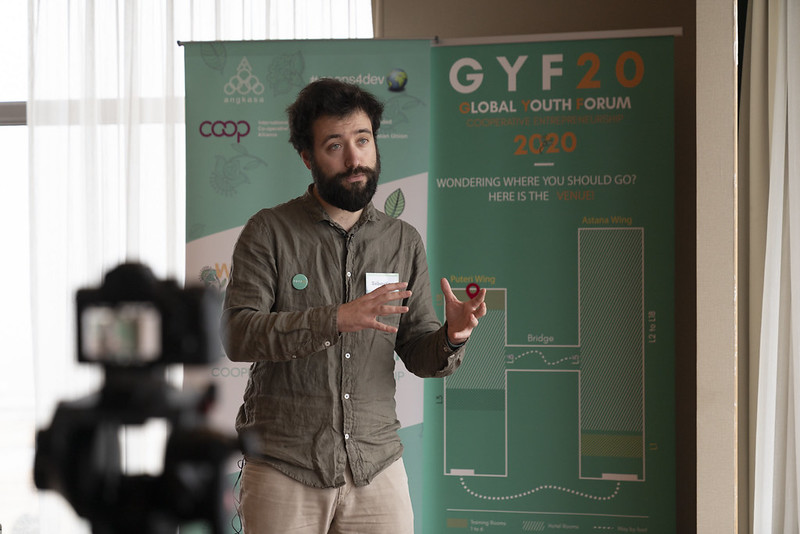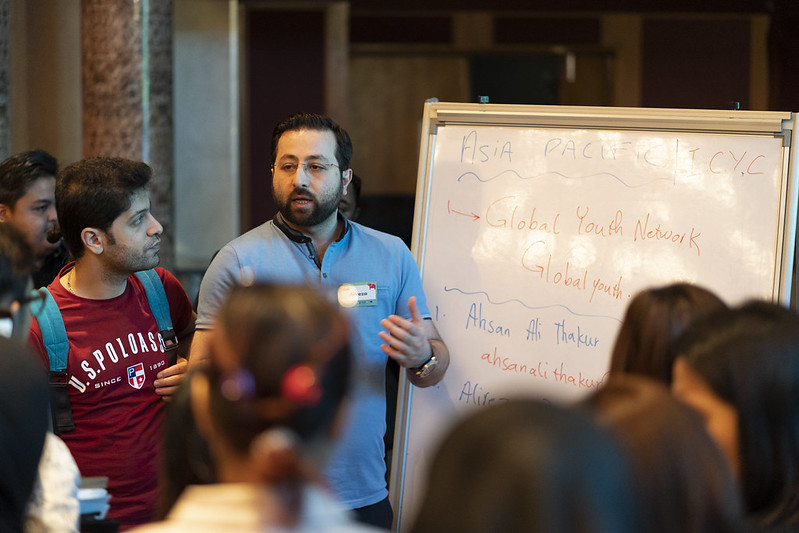
As the ICA celebrates its 125th anniversary, we talked to five members of the ICA Youth Network’s executive committee about the movement’s legacy and how it could shape the future..
If cooperatives didn’t exist today, why would they be needed and how would they be making a difference?

Ana Aguirre, Vice President for Europe, and Co-Founder and INNpulsory Business Lead at worker cooperative TAZEBAEZ in the Basque Country, Spain: As Mondragon founder José María Arizmendiarrieta always said, cooperatives must not be the end goal but a tool for development. We use cooperatives as a system to attain a better society. It’s a model that stands for shared ownership and democratic decision-making and that matters, but our aim should not be to just have cooperatives, but to have a more humane enterprise model. Another thing to bear in mind is that the cooperative model may not be for everyone. It is a value-based model that implies solidarity and I don’t think this is a value that applies to everyone. Society would be a lot better if everyone showed the same amount of solidarity as cooperatives. Here in Mondragon we created a system that encourages people to show solidarity and that is an amazing value because it makes one a better person after joining.

Sébastien Chaillou, President and Chief Director of the Solidarité Etudiante initiative in France: If cooperatives didn’t exist society would be much more violent. It would be all or nothing. Cooperatives and the winder social economy show us a different way of doing business. They act as a development tool – not only to fight for a common goal as a trade union or a political party would, but also to allow people to place values at the heart of what they do whilst doing things their own way. You can discover the cooperative model and adapt it yourself. People have to discover it little by little.

Alireza Banaeifar, ICA Youth Network’s executive committee member and International Affairs Manager Iran Chamber of Cooperatives (ICC): Cooperatives bring a number of social benefits, such as creating jobs or meeting supply and demand. The cooperative movement also empowers people by giving everyone an equal voice. In the chaotic world we live in, cooperatives are a great asset because the more people and businesses are thinking about increasing their economic share, the bigger the gaps between different countries and different groups of people get. In some areas people don’t know what to do with the excess of commodities and in other areas we witness people dying for a piece of bread. The cooperative movement shows these different groups of people how to work together, decide together and live together.

Angélica Soberanes, Vice-President for the Americas, and Communications Coordinator at Cooperativa La Cruz Azul in Mexico: I think if cooperatives didn’t exist we would invent them right now. They are very needed at this moment in time. Maybe we would call them the social economy or something else but cooperation would always exist, it’s in human nature.
Ahsan Ali Thakur, Vice-President for Asia-Pacific, Board and a Regional Director for Communications and Youth Representative for the Karachi Cooperative Housing Societies Union: If cooperatives didn’t exist, yes, they would have been invented now to provide solutions for people. I come from the cooperative housing sector. Housing prices go up day by day here in Pakistan and housing cooperatives would have been formed one way or another because they serve their local communities and are able to address the housing crisis.
What do you think is the role of the nearly two centuries old cooperative movement in tackling some of the challenges faced by young people today?
Ahsan: When we talk about youth unemployment and Covid-19 we also need to consider other community issues. Every problem can be subdivided into categories and the best way to address any issue is for the community members themselves to mobilise. Once they do, they can speak with a single voice. So cooperatives enable young people to speak up and have a greater impact to solve the issues they face.
Ana: Despite the great history, I believe that the best days of the cooperative movement are ahead of us. One of the main youth issues cooperatives can help to address is inequality – cooperatives encourage the participation of men and women in companies. In worker-owned cooperatives workers own and manage their enterprises and that is very powerful in terms of social justice. The cooperative movement is also extremely well aligned with the SDGs and the values of Generation Z. We also need to understand that the cooperative model is not a not for profit one. If we don’t have sustainable businesses and excellence in management, the cooperatives will fail and there will not be wealth to share. We need to make sure the businesses we create are sustainable, profitable and well managed.
Sébastien: The two-century-old movement can bring experience. Young people face challenges and want to tackle these including through entrepreneurship. The cooperative movement offers young people a democratic model that enables them to achieve positive changes.
You recently announced the winners of your Youth Replication Project. Could you tell us more about this?
Ana: This was a huge step for the youth network because it was the first time something like this was launched. There are so many programmes that provide seed capital to entrepreneurs but to have something focused on cooperatives was a first. We wanted to make sure the process was very well documented, clear and transparent to show that if we obtain resources allocated to youth, the youth responds. We received 150 applications from all over the world. This delayed our initial date of announcing the winners. We had a shortlist and then a jury came up with a set of criteria to select the winners. It’s important to understand what a huge response we had. Anyone can see the projects on the Youth Network’s website. We are also going to promote the projects that were shortlisted but did not receive funding. Our hope is to create a steady bridge between cooperatives and other entities that want to fund them, and young people across the world who are waiting to be funded.
What could the cooperative movement do to reach out to more young people?
Ana: The key is to not look at the past with nostalgia. We need to make sure that the future is appealing for people to be joining the movement. If not, they are not going to join a movement they think is in decay. The future needs to be portrayed as a modern solution, aligned with SDGs and the values of young people. We need to show face more in circles that are not our usual go-to places. When we are together we are strong but when we go out of that comfort circle with people aligned with our values, we start speaking with a lower voice. Our excellence doesn't just rely on the excellence of our products or services but also the model that we bring to the table. We need to show that this is a model for the future and that there are already young people fighting for this movement and leading it. We need to have these young people reach out to other young people. This is a modern movement, the values are in place, the innovation is there, the strength is there, the model is evolving with time and adapts to new legal frameworks and needs and we are at the forefront of social development. So I am sure cooperatives are here to stay.
Angelica: Here in the Americas we did research on how to engage young people in the movement. When you introduce someone to the cooperative movement most of the time they get it but some don’t – not everyone is ready for the social economy mindset. For some people, no matter how much you try to explain the model to them, they have an individualistic mindset. So maybe we need to communicate better, raising awareness and targeting messages at the youth.
Ahsan: One of our cooperatives in the housing sector in Pakistan created a cooperative club for the community members so that they could host wedding festivities or hire the venue for their own members. These initiatives create employment and build trust in the local community – so young people can see that the cooperative movement is doing something for their community and their generation. The cooperative model could also enable young refugees to learn new skills and set up their own businesses. When Pakistan was created as a state, young people came into the country and created their own housing cooperatives. The same model can be used to help refugees all over the world.
Alireza: In my country, where we have a large number of people willing to pursue higher education, the best way to do this is promoting the cooperative business model in schools and universities. The youth have creativity, ambition and energy but need support and practical experience. The cooperatives can benefit from their energy and ability to learn and adapt fast and the youth can benefit from the cooperative principles of working together and supporting each other.
Sébastien: I am always surprised to see how many young people I meet have discovered the cooperative movement through our small university project. So enabling a youth community to have that cooperative entrepreneurial experience is important. We also need to embody that we are an alternative rather than try to justify ourselves and say we are as good as other businesses. We have our own principles and want to be judged on those principles. In that way, we can appeal more to the youth who are looking for an alternative way of doing business.
The pictures had been taken at the Global Youth Forum on Cooperative Entrepreneurship 2020 (#GYF20)




